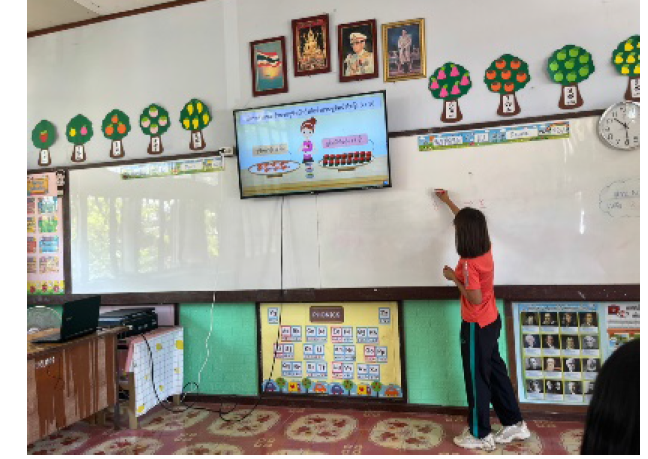ผลการจัดกิจกรรมการเรียนรู้โดยเน้นการคิดแบบฮิวริสติกส์ร่วมกับการใช้คำถามปลายเปิดที่มีต่อผลสัมฤทธิ์ทางการเรียน และความสามารถในการให้เหตุผลทางคณิตศาสตร์ เรื่อง อัตราส่วนและร้อยละ ของนักเรียนชั้นประถมศึกษาปีที่ 6
Main Article Content
บทคัดย่อ
การวิจัยนี้มีจุดมุ่งหมาย (1) เพื่อพัฒนาการจัดกิจกรรมการเรียนรู้โดยเน้นการคิดแบบฮิวริสติกส์ร่วมกับการใช้คำถามปลายเปิดให้มีประสิทธิภาพตามเกณฑ์ 75/75 (2) เพื่อเปรียบเทียบผลสัมฤทธิ์ทางการเรียน และความสามารถในการให้เหตุผลทางคณิตศาสตร์ของนักเรียนชั้นประถมศึกษาปีที่ 6 ที่ได้รับการจัดกิจกรรมการเรียนรู้ที่พัฒนาขึ้น กับนักเรียนที่ได้รับการจัดกิจกรรมการเรียนรู้แบบปกติ (3) เพื่อเปรียบเทียบความสามารถในการให้เหตุผลทางคณิตศาสตร์ก่อนเรียนและหลังเรียนด้วยกิจกรรมการเรียนรู้ที่พัฒนาขึ้น และ (4) เพื่อศึกษาความคงทนในการเรียนรู้ของนักเรียนหลังได้รับการจัดกิจกรรมการเรียนรู้ที่พัฒนาขึ้น กลุ่มตัวอย่าง ได้แก่ นักเรียนชั้นประถมศึกษาที่ 6 ที่กำลังศึกษาในภาคเรียนที่ 2 ปีการศึกษา 2564 จำนวน 2 ห้องเรียน คือ โรงเรียนบ้านหลัก จำนวน 26 คน และโรงเรียนชุมชนบ้านโนนเจริญ จำนวน 27 คน ได้มาโดยการสุ่มแบบกลุ่ม เครื่องมือที่ใช้ในการวิจัย ได้แก่ แผนการจัดการเรียนรู้แบบฮิวริสติกส์ร่วมกับการใช้คำถามปลายเปิด และแผนการจัดการเรียนรู้แบบปกติ แบบทดสอบวัดผลสัมฤทธิ์ทางการเรียนคณิตศาสตร์ ชนิดปรนัย 4 ตัวเลือก จำนวน 20 ข้อ และแบบทดสอบวัดความสามารถในการให้เหตุผลคณิตศาสตร์ ชนิดอัตนัย จำนวน 4 ข้อ ผลการวิจัย พบว่า (1) แผนการจัดการเรียนรู้โดยเน้นการคิดแบบฮิวริสติกส์ร่วมกับการใช้คำถามปลายเปิดมีประสิทธิภาพเท่ากับ 84.88/79.62 (2) ผลสัมฤทธิ์ทางการเรียน และความสามารถในการให้เหตุผลทางคณิตศาสตร์ของนักเรียนที่ได้รับการจัดกิจกรรมการเรียนรู้คณิตศาสตร์โดยเน้นการคิดแบบฮิวริสติกส์ร่วมกับการใช้คำถามปลายเปิดสูงกว่านักเรียนที่ได้รับการจัดการเรียนรู้แบบปกติ อย่างมีนัยสำคัญทางสถิติที่ระดับ .05 (3) ความสามารถในการให้เหตุผลทางคณิตศาสตร์หลังเรียนของนักเรียนที่ได้รับการจัดกิจกรรมการเรียนรู้คณิตศาสตร์โดยเน้นการคิดแบบฮิวริสติกส์ร่วมกับการใช้คำถามปลายเปิดสูงกว่าก่อนเรียน อย่างมีนัยสำคัญทางสถิติที่ระดับ .05 (4) นักเรียนที่ได้รับการจัดกิจกรรมการเรียนรู้ที่พัฒนาขึ้นมีความคงทนในการเรียนรู้
Article Details

อนุญาตภายใต้เงื่อนไข Creative Commons Attribution-NonCommercial-NoDerivatives 4.0 International License.
วารสารวิทยาศาสตร์และวิทยาศาสตร์ศึกษา (JSSE) เป็นผู้ถือลิสิทธิ์บทความทุกบทความที่เผยแพร่ใน JSSE นี้ ทั้งนี้ ผู้เขียนจะต้องส่งแบบโอนลิขสิทธิ์บทความฉบับที่มีรายมือชื่อของผู้เขียนหลักหรือผู้ที่ได้รับมอบอำนาจแทนผู้เขียนทุกนให้กับ JSSE ก่อนที่บทความจะมีการเผยแพร่ผ่านเว็บไซต์ของวารสาร
แบบโอนลิขสิทธิ์บทความ (Copyright Transfer Form)
ทางวารสาร JSSE ได้กำหนดให้มีการกรอกแบบโอนลิขสิทธิ์บทความให้ครบถ้วนและส่งมายังกองบรรณาธิการในข้อมูลเสริม (supplementary data) พร้อมกับนิพนธ์ต้นฉบับ (manuscript) ที่ส่งมาขอรับการตีพิมพ์ ทั้งนี้ ผู้เขียนหลัก (corresponding authors) หรือผู้รับมอบอำนาจ (ในฐานะตัวแทนของผู้เขียนทุกคน) สามารถดำเนินการโอนลิขสิทธิ์บทความแทนผู้เขียนทั้งหมดได้ ซึ่งสามารถอัพโหลดไฟล์บทความต้นฉบับ (Manuscript) และไฟล์แบบโอนลิขสิทธิ์บทความ (Copyright Transfer Form) ในเมนู “Upload Submission” ดังนี้
1. อัพโหลดไฟล์บทความต้นฉบับ (Manuscript) ในเมนูย่อย Article Component > Article Text
2. อัพโหลดไฟล์แบบโอนลิขสิทธิ์บทความ (Copyright Transfer Form) ในเมนูย่อย Article Component > Other
ดาวน์โหลด ไฟล์แบบโอนลิขสิทธิ์บทความ (Copyright Transfer Form)
เอกสารอ้างอิง
Banlak school. (2017 – 2019). Self Assessment Report (in Thai). Buriram: Academic Centre of Banlak school.
Buriram educational area district office 2. (2017-2019). Ordinary National Education Test (O-NET) (in Thai). Retrieved September, 1, 2021, from: https://www.br2.go.th
Hasanah, A. and Karyati, K. (2018). The use of open ended problem in developing mathematical reasoning ability of junior high school students on geometry. International Conference on Mathematics and Science Education of Universitas Pendidikan Indonesia Journal, 3, 763-767.
Kentawee, S. (2014). The development of heuristics learning activities on one variable linear equation for Mathayomsuksa 1 students (in Thai). Journal of graduate school Pitchayatat Ubon Ratchathani Rajabhat University, 9(1), 99-106.
Koonta J. and Pan-ngam A. (2013). A development of mathematics reasoning ability through the heuristics thinking model for Prathom Suksa 3 students of Ban Nongkhun School under Ubon Ratchathani Primary Educational Service Area Office 3. Ubon Ratchathani Journal of Research and Evaluation, 2(1), 62–69.
Mao-saman, C., Areeruksakulkonglok, S. and Somchaipeng, T. (2019). The effects of activities using heuristics thinking approach of fraction on mathematics learning achievement and mathematics creative ability of Mathayomsuksa 1 Students in Si Sa Ket Province (in Thai). Si Sa Ket Rajabhat university journal, 13(3), 40-48.
The Institute for the Promotion of Teaching Science and Technology (IPST). (2012). Mathematical thinking process skills (in Thai). Bangkok: Q media.
The Institute for the Promotion of Teaching Science and Technology (IPST). (2017). Basic education core curriculum B.E. 2551 (A.D. 2008) Edition 2560 (A.D.2017) (in Thai). Bangkok: IPST.
The Ministry of Education, Thailand. (2008). The Basic education core curriculum B.E. 2551 (A.D. 2008) (in Thai). Bangkok: The Agricultural Co-operative Federation of Thailand Ltd.
The National Institute of Educational Testing Service (NIETS). (2003). Alternative Assessment
Guidelines (in Thai). Bangkok: Teachers Council of Thailand Trade Organization.
Widiartana, I.P.H. (2018). The effect of open-ended approach towards students’ mathematical reasoning. Journal of Physics: Conference Series, 1028(2), 012134.


